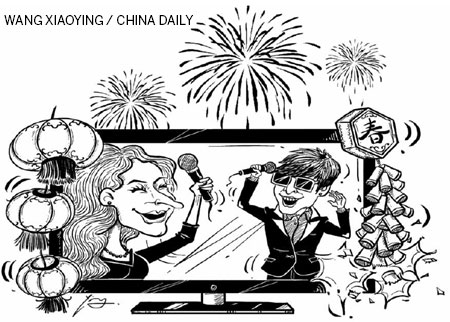Spring Festival gala is good as it is

French film personality Sophie Marceau and South Korean actor and singer Lee Min-ho have been invited as guests to the most-viewed Spring Festival television gala on Lunar New Year's Eve, sparking a public controversy.
There is nothing wrong in inviting foreign stars as guests on China Central Television's Spring Festival gala, especially because a huge number of Chinese have fallen to the charms of foreign celebrities, and foreign fashion and music since China introduced reform and opening-up more than three decades ago.
But the invitations extended to foreign stars have more to do with business than the evolution of culture in China. And it is precisely business that the CCTV gala's producers do not seem to understand, for they may not succeed in attracting a foreign audience by inviting foreign stars to their show.
Reports say a CCTV gala last year featured only foreign artists. What was the program supposed to show: That Spring Festival had become international? That is not likely to be, and that is the way it should remain.
Growing up in Canada, I was fond of the annual Bye Bye show, which used to review the passing year. The program was conducted by Les Cyniques, who were very clever at and innovative in their analyses of the events of the past 12 months. After a few years, I as well as some others lost interest in the program, and Bye Bye 1990 was the last I saw. The program was later stopped, because most of the viewers considered it a waste of time.
The content of the Canadian program was very different from the CCTV gala, which is an album of the different aspects of Chinese culture. I watched the CCTV gala during my first few years in China but stopped doing so because it was too repetitive: A big show with the same content year after year.
In 2013, Celine Dion was invited, and although I admire the Canadian singer, I still skipped the show. And I don't know anyone among my few foreign friends who watched the program for Celine Dion.
China is a land of great culture, of traditional and modern songs, of dance and opera, of cross talk, of acrobatics and the martial arts. The CCTV gala reflects that great culture. So the presence of a foreign artist may attract a larger number of Chinese audience but not more foreigners. Those who like the show or are curious about it will watch it irrespective of the presence of a foreign star.
In fact, the presence of a foreign star may have an effect contrary to expectations on the Chinese audience. In the West, the star attraction usually doesn't open the show and it is not known when he or she will appear on stage. But that is not likely to be the case with the CCTV gala. So will Chinese audiences watch the lengthy show after seeing the star attractions perform?
Some people say it costs a lot to invite a big foreign star to a Chinese show, which could be saved and used for a better cause, and they are right. But the debate on whether the huge amounts paid to foreign stars to perform on Chinese shows should be spent on humanitarian causes is different from the debate on whether foreign stars on Chinese shows can attract foreign audience.
When the United States sent a manned mission to the moon in the 1960s at a huge cost, some people said the money should instead be used to help the poor. The problem is that even if the moon mission were cancelled, the American government would not have spent the money on the poor.
So our debate should be centered on whether the presence of Sophie Marceau and Lee Min-ho on this year's CCTV Spring Festival gala will make the show more popular among foreigners. The answer has to be in the negative. Spring Festival, with all its attributes and manifestations, is for the Chinese people, and there is no need to export it to other countries or spend exorbitant amounts to attract foreign viewers to programs that celebrate the spirit of the festival.
The author is a Canadian freelance writer.


















